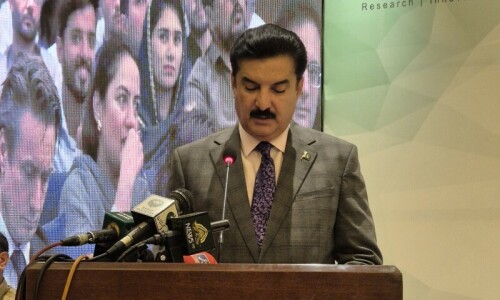NEW DELHI: India has tested a ballistic missile capable of carrying a nuclear warhead up to 5,000 kilometres, the defence ministry said, in what media called a “stern signal” to China as the two remain locked in a border spat.
The Agni-5 missile blasted off from Abdul Kalam Island off India’s east coast late on Wednesday and splashed into the Bay of Bengal.
“The successful test... is in line with India’s stated policy to have ‘credible minimum deterrence’ that underpins the commitment to ‘No First Use’ [of nuclear weapons],” a defence ministry statement said.
The 17-metre-tall missile has been tested several times before, but not at night, and local media said that the timing was aimed at sending a signal to Beijing.
Tensions with China have been running high since 20 Indian soldiers died in clashes on their disputed Himalayas border in June 2020.
The nuclear-armed neighbours have since reinforced the frontier with tens of thousands of extra troops.
India has deepened defence cooperation with Western countries in recent years, including in the Quad alliance with the United States, Japan and Australia.
New Delhi is also a major buyer of Russian military hardware, and ordered Moscow’s S-400 missile defence system despite the threat of US sanctions over the $5.4 billion deal.
The Financial Times reported this month that China had tested a hypersonic missile that circled the Earth at low orbit before descending towards, but missing, its target.
Beijing denied the report, insisting it was a routine test of a reusable space vehicle.
Hypersonics are the new frontier in missile technology, because they fly lower and are harder to detect than ballistic missiles, and can reach targets more quickly.
The United States, Russia, China and North Korea have all tested hypersonic missiles and several others are developing the technology — including reportedly India.
According to the Times of India, New Delhi is working on enabling the Agni-5 to carry several nuclear warheads at once so they can split up and hit different targets.
Arms race
Responding on Thursday to the testing of Agni-5, Pakistan expressed serious concerns over India’s continued pursuit of lethal weapons.
Answering questions at his weekly press conference, Foreign Office spokesperson Asim Iftikhar said New Delhi’s hostile posturing towards its neighbours further imperilled peace and stability in South Asia.
It must be alarming for the international community that at a time when the region is facing the growing and real threat of extremist Hindutva ideology, which espouses territorial expansion, the BJP-RSS government is seeking an arms race, he said.
The missile test by India would further vitiate the political and security environment in the region, Mr Iftikhar added.
Published in Dawn, October 29th, 2021













































